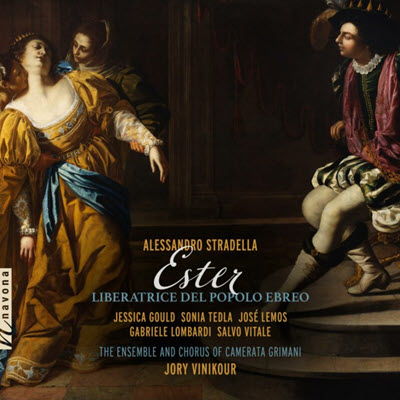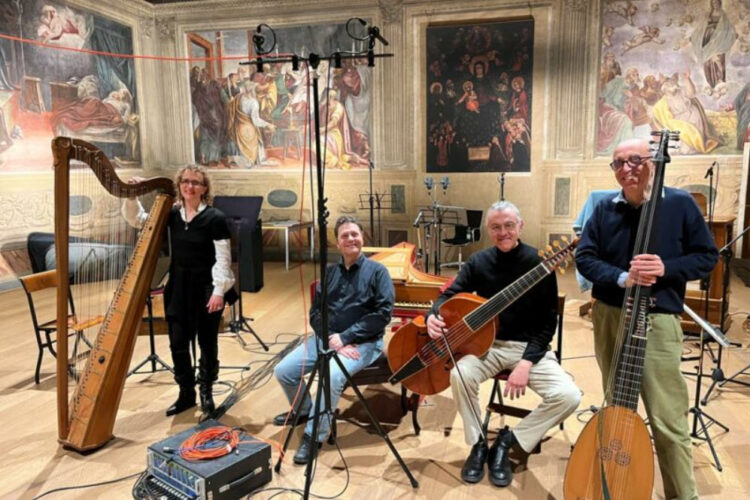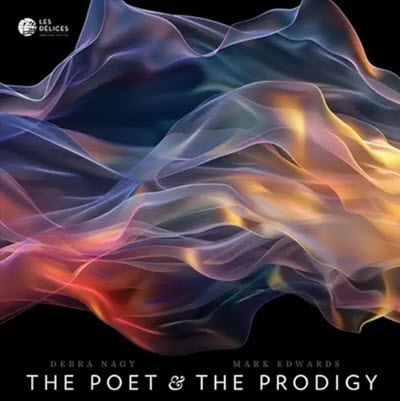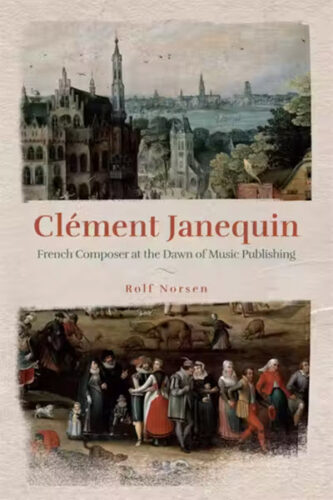by Ian Pomerantz
Published October 6, 2024
Alessandro Stradella: Ester, Liberatrice del Popolo Ebreo. Camerata Grimani and soloists, led by Jory Vinikour. Navona Records NV6629 (2 CDs)
The Italian ensemble Camerata Grimani, led by American keyboardist Jory Vinikour, and with a strong cast of Italian and American soloists, have released the first complete recording of Alessandro Stradella’s 1673 oratorio Ester, Liberatrice del Popolo Ebreo in a 2-CD set on Navona Records. (Ester, subtitled Liberator of the Hebrew People, has only been recorded once, in 2001, by Il Concerto Franco Ferrari.)

This much-anticipated new recording is the brainchild of American soprano Jessica Gould, who also sings the title role. Stradella’s Italian setting of the Book of Esther, rich in metaphor, was composed at the height of the Counter-Reformation. Though oratorios reached a peak of popularity in Britain, they were born in mid-17th-century Italy to provide dramatic delight as the Catholic Church searched for cultural counterweights to the Protestant movement spreading in Northern Europe. Many of these early oratorios, which blended the new operatic ideas coming from Florence with biblical narrative, depended heavily on exciting stories from the Hebrew Scriptures.
Stradella’s retelling of Ester, to a libretto by Lelio Orsini, has been a subject of intense study for Gould. She led the second and third America revivals of the piece, both of which took place at synagogues — centering the story’s Jewish roots and themes of Jewish resilience and survival against the genocidal plotting of Haman and the heroine’s courage. She and Vinikour now bring Ester home to Italy. They recorded the oratorio in 2023 at Sala della Carità in Padua.
Gould is no stranger to what she calls Stradella’s “Caravaggian” style — the Italian middle Baroque period of the painter Caravaggio, characterized by its flamboyance and sudden and drastic shifts between emotional extremes; Musically, a similar style sits between the death of Monteverdi and the rise of Vivaldi. Gould is also an award-winning filmmaker and has explored the early Italian Baroque repertoire in her film Babylon: Ghetto, Renaissance, and Modern Oblivion through the eyes of the denizens of the Venice Ghetto. In this Ester recording, her performance radiates commitment and an almost cinematic vitality that displays her history and artistic engagement in Italy and her devotion to this repertoire.

Italian soprano Sonia Tedla sings the role of Speranza Celeste (Heavenly Hope), a symbolic figure that emanates straight from the Italian Baroque imagination and is found nowhere in the Book of Esther. Tedla’s quicksilver vocalism provides the perfect foil for Gould’s impassioned heroine. Where Tedla is angelic, Gould is earthy. Where Tedla is effervescent and bright, Gould is sensuous and velvety. Hearing them side-by-side is a delight.
Baritone Gabriele Lombardi is remarkable in the role of the genocidal Persian villain Aman (Haman), in which he fluctuates between the murderous in “O furie” to the simpering in “Piangete” in crisp Italian and fine vocalism. The highlight of this recording must be the duet, or rather the ultimately florid vocal duel, between Aman and Speranza Celeste that closes the first act, in which Heaven directly confronts Haman with the warning “You are deluding yourself.” Speranza Celeste, of course, has the last word. An impressive raft of lower male voices includes bass Salvo Vitale in the role of Assuero (Xerxes), vocally painting a buffo-like portrait of a drunken leader easily led astray by advisors.
José Lemos’ countertenor captures the pressing exasperation of Jewish leader Mardocheo, pleading with Ester in “Vanne ai piè” to go to the feet of her king even though such a breach of imperial protocol risks execution. Stradella looks backwards towards the style of Carissimi and Monteverdi in the recitatives of the narrator Testo, performed with expressive phrasing by bass Guglielmo Buonsanti, rounding out the main cast. Sopranos Anna Piroli and Maria Dalia Albertini, in the roles of two Hebrew women, sing a lovely duet in Act 1.
Jory Vinikour, leading the ensemble from the keyboard, takes an approach remarkably different from that earlier recording by Il Concerto Franco Ferrari. Here, the chorus is made up of soloists, which gives the choral numbers a chamber-like feel, allowing for an intriguing sense of internal conversation among individuals. The Grimani ensemble has a robust sound that conveys the Italian libretto with rhetorical flair.
The full recording is available as a CD, to stream, or on YouTube.
But the visionary importance of this recording is only partially due to the musicianship of the performers. The Camerata Grimani and its singers depart from Northern European or Germanic schools of early-music performance that are often associated with historical performance centers such as The Hague, Basel, and Oxford, and which base much of their tradition on Protestant — largely Anglican and Lutheran — schools of singing and playing. When imposed on seicento dramatic works, this stylistic aesthetic represents a musical incongruity that has led some northern institutions (and their graduates) to spurn HIP music-making from elsewhere in Europe as unerudite or otherwise ahistorical — specifically when it draws on Catholic, Orthodox, or Jewish models.
Camerata Grimani, with its intense emotional vocabulary and vocal honesty, focuses their fine musicianship squarely in the Mediterranean of emotional expression. It is utterly refreshing to hear Italian singers singing Italian music, led by a Jewish woman telling a Jewish story, and this should be considered the seminal recording of the work.
Bass-Baritone Ian Pomerantz is artistic director of Les Enfants d’Orphée, specializing in French Baroque chamber music for voice. For EMA, he is author of the essay “Let’s Talk About Antisemitism in Our Field.” His latest recording is Art Songs of the Jewish Diaspora.




